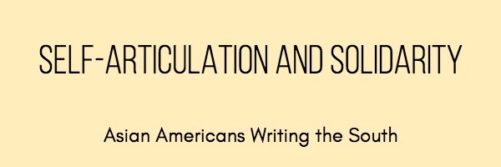On the Genesis of Self-Articulation and Solidarity
by Shamala Gallagher
In fall of 2015, we began a conversation about what it means to be Asian American and living in the American South. We didn’t know what it meant. We decided to talk about this for as long as we needed to, which perhaps would be forever. We began by gathering questions. For a long time, we had only questions.
We came together because all of us belonged to Kundiman, a national organization dedicated to Asian American creative writing, and all of us were connected, somehow, to the South. Many of us had arrived here to write, because all of us are poets and poets tend to do this: cast ourselves rootlessly across the country, bravely building lives in the towns that will take us. This was the case with Ching-In Chen in Houston and Huntsville, Texas; Marci Calabretta Cancio-Bello in Miami; Kimberly Alidio in Austin; and Muriel Leung, then living in Baton Rouge. It was also my situation, living—as I do still—in Athens, Georgia. Some of us had grown up in the South and then left it: this was true of Wo Chan and Sarah Gambito, both from Virginia. Vidhu Aggarwal was raised in the South and had returned there, living in Orlando; Tiana Nobile had made a home in New Orleans, building community activism into her chosen home.
Sprawled as we were across this complicated territory, this land steeped in violence and love which we understood and didn’t—those of us living in the South talked to each other on video chat, waiting for one another’s faces to appear in small boxes on our screens. We were hungry to know particulars of each other’s lives. What does the street you live on look like? Who’s there in your neighborhood, and how do those people interact with each other? Do you have Asian American community there, POC community there, queer community there? Who do you understand yourself to be now that you live there?
I kept bringing up this last question, “Who are you?”—and all of us laughed. But we answered it wildly, with talk and with poems. Over the next two years, a few conferences gave us the opportunity to bring some of our conversation into shared physical space. We put on panels at the Association for Asian American Studies Conference in Miami in April 2016; at the February 2017 AWP conference in Washington, D.C.; and at the New Orleans Poetry Festival in April 2017.
As our first panel approached, we began to worry that we weren’t qualified to speak about our subject. We were too idiosyncratic, too scattershot. So many of us weren’t from the South: we felt ourselves imposters. Some of us had just arrived; we didn’t know the Asian communities yet in our cities and towns; we weren’t historians; we hadn’t done enough work. Our first audience was small, close-knit, friendly, and the panel went great—and then when our second panel approached, we began to worry the same thing.
I remember walking into the room designated for our panel at AWP in D.C.—afraid that no one would come, afraid that “Asian Americans Writing the South” was too specific to us, too esoteric—and then seeing so many faces in the audience, and so many of them Asian. So many people I had never met before came up to me afterwards and said: I’m Asian American and I grew up in the South….
When the panelists worried that they didn’t know enough about the topic, I—also fearing that I didn’t know enough, but needing to be brave because I had roped everyone into this—said: this is just a beginning. This is just a cluster of voices. This is just a cluster of Asian American poets confronting the histories in this region and imagining our present. And, to me, it felt right.
I wasn’t present for the third iteration of our panel, the one that met in New Orleans, but the other poets told me that this third conversation was particularly strong, perhaps the most interesting and fertile talk on this subject yet. The poets said that meeting in a Southern city, Tiana’s chosen home, made their talk especially rich and rooted. Too, by this time, they’d talked enough with each other that the balance was just right—not too hesitant, but not too formal—and allowed them the comfort to ask important political and personal questions.
I’m really excited and grateful for this opportunity Poetry Northwest gave us to feature the thoughts of so many who participated—and to extend this conversation into printed space. Asian Americans in the South, people of color in the South, people in solidarity with us anywhere: these writings are an offering. This is the beginning of our reaching out to you, and we can’t wait to hear what you have to say.
—

Shamala Gallagher is an Indian/Irish American poet and essayist whose recent work appears in Poetry, Black Warrior Review, West Branch, The Offing, the Rumpus, and elsewhere, and is forthcoming in the second volume of Bettering American Poetry. She is working on a memoir/essay collection.
